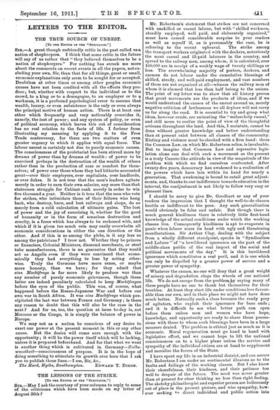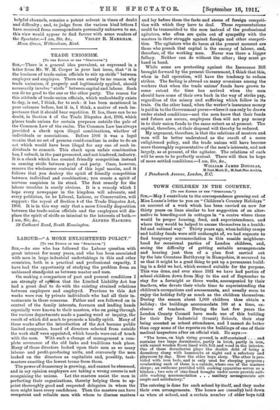THE LESSONS OF THE STRIKE.
[To THE EDITOR 07 T'RE "Sracvirox."1
SIR,—May I ask the courtesy of your columns, to reply to some of the criticisms which have been made on my letter of August 26th ? Mr. Robertson's statement that strikes are not concerned with unskilled or casual labour, but with "skilled workmen, steadily employed, well paid, and elaborately organized," must have caused considerable surprise to your readers as well as myself if, as is presumably the case, he is referring to the recent upheaval. The strike among the transport workers originated with the dockers, notoriously the most casual and ill-paid labourer in the country, and spread to the railway men, among whom, it is calculated, over 100,000 are in receipt of a weekly wage of twenty shillings or less. The overwhelming majority of porters, dockers, and carmen do not labour under the cumulative blessings of skilled, steady, and well-paid employment, and vast numbers of them are not organized at all—witness the railway men of whom it is claimed that less than half belong to the unions. The point of my letter was to show that all history proves that great movements are the products of ideas, and if we would understand the causes of the unrest around us, merely negative criticism of lawlessness we all deplore will not carry U8 far along the road. It is essential to try and grasp what ideas, however crude, are animating the "melancholy casual," and still more to realize the point of view of the thoughtful artisans throughout the land. And this, I maintain, cannot be done without greater knowledge and better understanding than at present exist between all classes of the community. Rioting and violence must be checked with a firm hand : there the Common Law, on which Mr. Robertson relies, is invaluable. But to imagine that Common Law and repressive legis- lation alone can deal with such a movement as the present is a truly Canute-like attitude in view of the magnitude of the problem with which we find ourselves confronted. After twenty-five years, democracy has awakened to a realization of the powers which have lain within its hand for nearly a generation. That awakening is bound to entail great adjust- ments, and, thanks to our indifference towards education in the interval, the readjustment is not likely to follow very easy or pleasant lines.
I should be sorry to give Dr. Goodhart or any of your readers the impression that I thought the well-to-do classes hostile or indifferent to the poor. Any such generalization would obviously be false and unfair. But though there is much general kindliness there is relatively little first-hand knowledge of the actual conditions under which the working classes live. Consequently kindliness is apt to evaporate in panic when labour rears its head with ugly and threatening manifestations. Sir Arthur Clay, dealing with the subject from a wholly different standpoint, speaks in "Syndicalism and Labour " of "a bewildered ignorance on the part of the middle-class public of the real import of the social and political movements of the day." It is this bewildered ignorance which constitutes a real peril, and it is one which can only be dispelled by a greater power of service and a greater power of sympathy.
Whatever the causes, no one will deny that a great weight of misery and degradation clogs the wheels of our national life. We do not escape from the problen4y saying many of these people have no one to thank but themselves for their troubles. At least they start life under conditions less favour- able than our own, and in their place we might not have done much better. Naturally such a class becomes the ready prey of agitators, who exploit their ignorance for base ends ; and it is difficult to see what better path can open before them unless men and women who have hope, knowledge, and opportunity are ready to share these posses- sions with those to whom such blessings have been in a large measure denied. The problem is ethical just as much as it is economic. Moral regeneration must go hand in hand with legislative effort, and we cannot hope to lift the national consciousness on to a higher plane unless the service and sympathy of the individual citizen are at hand to supplement and moralize the forces of the State.
I have spent my life in an industrial district, and can assure Mr. Robertson I am under no sentimental illusions as to the faults and failings of the working classes. But I also know their cheerfulness, their kindness, and their patience too well to despair of the future. The need was never greater than at present for clear thinking no less than right feeling. The sketchy philanthropist and superior person are ludicrously out of place in the present picture, and wise sympathy, how- ever seeking to direct individual and public action into
helpful channels, remains a potent solvent in times of doubt and difficulty ; and, to judge from the various kind letters I have received from correspondents personally unknown to me, this view would appear to find favour with some readers of
the Spectator.—I am, Sir, &c., VIOLET R. MARKHAM. .Moon Green, Wittersham, Kent.











































 Previous page
Previous page